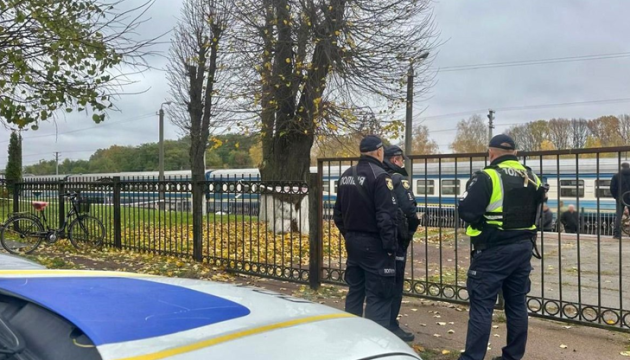Listen to the article
Russian Propagandists Forge Ukrainian News to Discredit Armed Forces
Russian propaganda outlets have intensified their disinformation campaign against Ukraine by manipulating legitimate news reports to falsely implicate Ukrainian military personnel in criminal incidents, security officials revealed this week.
In a recent case, Russian media and social media networks circulated doctored screenshots claiming that a man who detonated a hand grenade near a train in the Zhytomyr region on October 24 was a Ukrainian serviceman. The fabricated reports specifically alleged the perpetrator was contracted under the “18-24” military recruitment program and served in the 58th Brigade of the Ukrainian Armed Forces.
Analysis of the materials shows clear evidence of digital manipulation. Propagandists used graphic editing software to insert a fabricated sentence into the first paragraph of an authentic Ukrainian news article, adding the text: “Preliminarily, the explosion was caused by a participant in the ’18-24′ program from the 58th Infantry Brigade.”
Ukrainian law enforcement agencies have confirmed that official reports on the Ovruch railway station incident make no mention of military involvement. Authorities have only stated that the suspect had previously been detained while attempting to illegally cross the border.
This case represents just one instance in a broader pattern of Russian disinformation targeting Ukraine’s military recruitment efforts. In another recently identified forgery, Russian propagandists manipulated a headline from a local Sumy media outlet to falsely claim that a fire at a garage cooperative was “caused by a military mechanized brigade.” The original report noted that emergency services were still investigating the cause of the fire when the article was published.
“These forgeries follow a predictable template,” said a Ukrainian security analyst who requested anonymity due to the sensitive nature of his work. “They take legitimate local crime reports, digitally insert references to Ukrainian military units, and then amplify these fabrications across their networks. The goal is clearly to undermine public confidence in Ukrainian forces.”
The targeting of Ukraine’s “18-24” contract program appears strategic. Launched earlier this year, the initiative aims to bolster Ukraine’s defensive capabilities by recruiting younger volunteers through enhanced benefits packages. By associating these recruits with criminal activity, Russian propaganda seeks to hamper recruitment efforts at a time when Ukraine needs to maintain force strength against ongoing Russian aggression.
Digital forensics experts point out that these forgeries often contain subtle inconsistencies that reveal their fraudulent nature. Typography mismatches, alignment issues, and inconsistent formatting between the inserted text and original content serve as telltale signs of manipulation.
This campaign represents an evolution in Russia’s information warfare tactics. Rather than creating entirely fabricated stories, propagandists are modifying legitimate Ukrainian news reports, making the disinformation more difficult to identify and more likely to be believed by casual readers.
Ukrainian media literacy organizations have responded by publishing guides to help citizens identify manipulated news stories, focusing on verification techniques such as cross-referencing reports across multiple reliable sources.
Ukrainian counter-disinformation specialists note that these incidents follow similar patterns to earlier forgeries targeting media in the Kharkiv and Sumy regions, where crime reports were likewise doctored to falsely implicate Ukrainian military personnel.
As the conflict approaches its third year, these digital manipulation tactics illustrate how information warfare remains a critical front alongside physical combat, with both sides recognizing the strategic value of public perception and morale in sustaining their respective war efforts.
Verify This Yourself
Use these professional tools to fact-check and investigate claims independently
Reverse Image Search
Check if this image has been used elsewhere or in different contexts
Ask Our AI About This Claim
Get instant answers with web-powered AI analysis
Related Fact-Checks
See what other fact-checkers have said about similar claims
Want More Verification Tools?
Access our full suite of professional disinformation monitoring and investigation tools




9 Comments
Interesting how Russian propaganda tries to discredit Ukraine by manipulating news reports. It’s important to verify information and not spread misinformation, no matter the source.
Fabricating evidence and falsely implicating Ukrainian soldiers is a low tactic by the Russian propagandists. This kind of deception undermines trust and transparency.
It’s disappointing but not surprising to see Russian media engaging in these manipulative tactics. Maintaining integrity of information is crucial during conflicts.
I agree. We must be diligent in separating fact from fiction, no matter the source. Spreading unverified claims only serves to further muddy the waters.
This is a concerning example of how misinformation and propaganda can be used as weapons. We must remain vigilant and fact-check claims, especially those related to military and security matters.
Doctored news reports and false narratives are dangerous tools in the information war. It’s critical that we scrutinize all sources and resist the urge to spread unverified claims.
This is a concerning trend of Russian disinformation campaigns. It’s crucial that we carefully scrutinize all news and information, especially regarding military and security matters, to avoid being misled.
Absolutely. Fact-checking and critical thinking are essential to counter the flood of false narratives. We must remain vigilant against propaganda from any side.
Forging evidence to discredit the opposing side is a classic tactic of Russian propaganda. We must be extremely cautious about what we believe and share, especially during times of conflict.